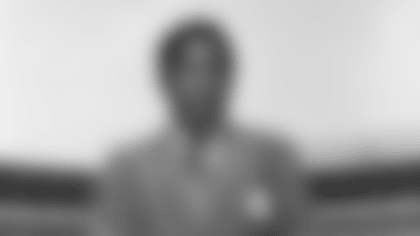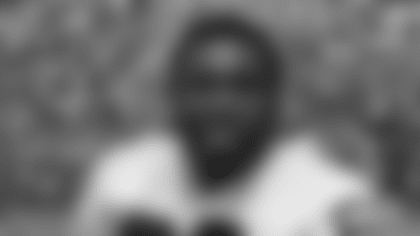November is American Diabetes Month, an opportunity to bring awareness to a disease that according to the CDC is something more than 30 million Americans live with.
And sadly, many youth 18 years old and under are among those who live with the disease.
But the good news is, it's a disease you can live with, and live a normal life.
Steelers defensive lineman Henry Mondeaux and tight end Kevin Rader are proof of that.
Both Mondeaux and Rader have Type 1 diabetes and shared their stories with local youth living with it as well on a zoom call organized through JDRF, the Juvenile Diabetes Research Foundation. Shannon Davis, the Senior Development Manager in the Western and Central Pa. region, hosted the video call, an opportunity for the kids to hear Mondeaux and Rader's stories and take part in a Q & A with the players.
"I got diagnosed when I was 15, so a little later than some here today," Mondeaux told the group as he introduced himself. "It was my freshman year of high school. I got pretty sick, lost a lot of weight. I had a lot of the symptoms that would point to diabetes. I had a test but for some reason it came back negative. We were trying to figure out what it was. I didn't get my results until a few weeks later. I got a blood test, spent about a week in the hospital.
"The biggest challenge for me is getting used to having it. I am a big guy, I eat a lot of food, I have a sweet tooth. It was hard for me when all my friends were eating. It was changing that part of my life. It's definitely helped in ways I didn't expect it to. I know a lot more about food. That can help you out when you know what you are putting in your body and how it will affect you.
"The toughest thing I have had to overcome is the diabetes. I had a tough time with it at first and that is okay. It's good to talk about it. You can live just as good of a lifestyle with it or without it."
Rader, who is from the Pittsburgh area, first showed signs of being diabetic when his family went on a trip to their lake house in nearby Somerset, Pa.
"While I was there I lost 5-8 pounds the first day," said Rader. "I would eat something and throw up. My parents thought I had mono because my brother had it before. This went on for two and a half days until I went back home. At that point I lost 20 pounds. I was in the car nearly passing out and my dad took me to the hospital. My family doesn't have a history of diabetes. The doctors ran numerous tests on me. I remember one doctor pricked my finger and my blood sugar was 786 and that is when I found it.
"It was an eye-opening moment, taking in all that entailed. The frustrations of taking all of that in was mainly accepting that I had it. I didn't know anyone who had it, so it was rough on me, getting used to the tests and insulin shots and stuff like that."
Rader said making it where he is today while being an underdog and living with diabetes is one of the biggest obstacles he has been faced with in life.
"I was a walk-on in college. I had to overcome that," said Rader. "Same thing, undrafted going into the NFL. Really diabetes, as long as you manage it, take ownership and make it part of your lifestyle, it won't hold you back at all."
Following introductions from the players and the kids, the questions began.
They were fun, like what sport would you play if you didn't play football. For Rader, it was snowboarding. For Mondeaux, it would be golf, although he was quick to admit he isn't good at it.
And the questions were serious too, from what they eat before a game to make it through, what they eat when their sugar drops, and how playing football impacts their diabetes.
"I don't find myself in situations where my job has impacted the way I handled it," said Mondeaux. "The issues come from the diabetes and it's just about controlling it. I don't think football adds any extra challenge, it's just part of it."
Both admitted being around friends, especially in college, was tough because of their friends eating habits, as well as the unstructured schedules for students as repetition and a routine helps both of them manage their diabetes.
Before they finished talking to the kids, they shared words of encouragement and let them know they are all in it together.
"The hardest thing for me was to be comfortable out in the open with it and not feel ashamed or embarrassed, especially at first," said Mondeaux. "The more comfortable or open you can be, then people are understanding. Just accepting it for me had been the hardest part.
"You guys are on a great track sharing your stories. You guys are all going to be fine. Just stick with it. There are going to be tough days, but just like anything in life keep pushing through."
Rader echoed his thoughts.
"When I was growing up, I had a tough time accepting it," said Rader. "I got it when I was in high school. Kids are judgmental. I think the biggest part is accepting you have it. At some point you have to just live your life and not worry about what people think. I think that will help you in the long run."














